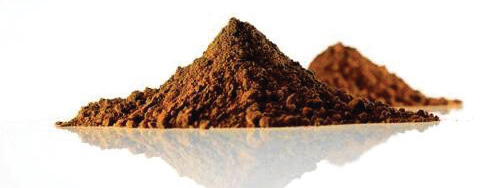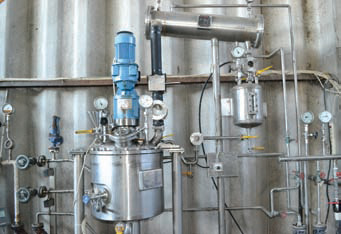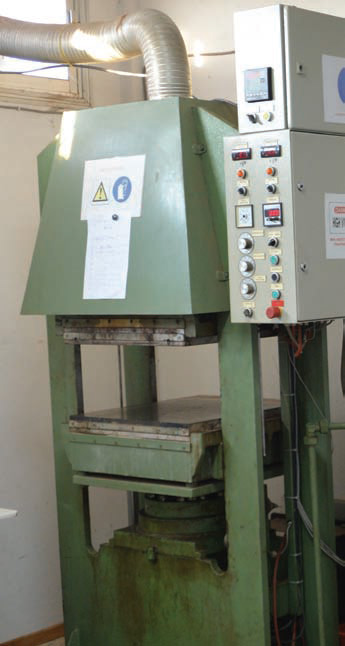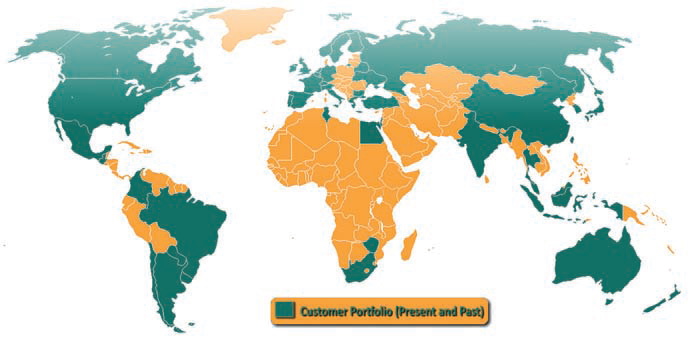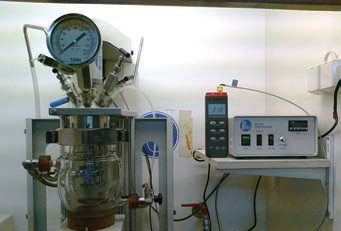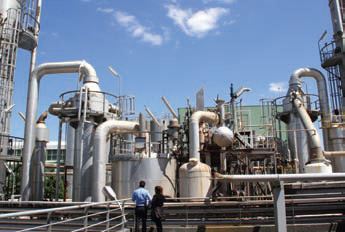Biopolymers in Wood Adhesives
23 March 2016In an era of environmental strain caused by fossil fuel based chemicals, and increased concern over the long-term supply of petrochemicals, there is growing interest in binders obtained from renewable resources. Chimar Hellas says it is a specialist in this area.
Chimar Hellas, headquartered in Thessaloniki, Greece, has weathered the economic storm in its home country by always having been an exporter of its expertise; the company's strength lies in its know-how in the production of various resins used in wood based panel manufacture.
The company says that the wood based panel sector finds it extremely difficult to switch from the conventional amino and phenolic resins to biopolymers, which, says Chimar, can simultaneously provide: sustainability; productivity; performance; compliance to the legislative requirements; acceptable formaldehyde emissions; and cost saving (or at least cost-neutral) production.
The only fossil based, commercially available, alternatives to formaldehyde based chemistries are isocyanate-type binders, which satisfy the NAF (No Added Formaldehyde) requirement.
As chemical modifications continue to be the sector's biggest challenge, with the lack of availability of sufficient feedstock being the second challenge, any bio-based binder hoping to enter the industry should offer the end-user ease of handling and storage, nontoxic chemistry, and it should be safer than the existing binders.
It is also essential that the binder creates no problems when it enters the production process, by using the same processing conditions as a conventional binder; and by ensuring the availability of the required raw materials.
Taking all the above into consideration, Chimar Hellas says it has entered into two cooperative schemes.
One was with Finnish plywood manufacturer UPM. This targeted the development of a process to activate lignin and subsequently to introduce that activated lignin into phenolic-type adhesives.
The second such scheme was with EcoSynthetix, targeting the development of an engineered biopolymer which could act as a binder for lingo-cellulosic materials.
The cooperation with UPM resulted in developing an activation process for purified Kraft lignin, a pulping process by-product commercially sold by UPM under the trade name BioPiva.
Large-scale industrial production runs have proved that the lignin-based resins produced are perfectly suitable for plywood and HPL (High Pressure Laminate) applications.
Lignin is one of the most abundant biopolymers, predominantly found in wood and having the role of supporting the structure of the plant: It lends rigidity to the wood and does not rot easily.
Chemically speaking, lignin is a cross-linked phenol polymer and therefore has been at the epicentre of the work by phenol formaldehyde adhesive researchers for at least 50 years.
Chimar says that nowadays, together with UPM, it has overcome all the difficulties that inhibited the widespread use of lignin.
Availability, supply and purity of lignin are no longer issues worth mentioning, while the reactivity is satisfactory since the activation step has been introduced. The operation of several lignin purification units has secured availability of high purity lignin at competitive cost, says the company.
The lignin based adhesives exhibit exactly the same binding potential as any reference PF adhesive and can be processed using the same equipment and production parameters.
The relatively high lignin content of the proposed adhesives ensures economic advantages over the reference adhesives, even these days when low oil prices have reduced the price of petrochemicals, adds the company.
Lignin based plywood and HPL adhesives, containing high amounts of lignin, have been successfully used in several industrial processes with acceptable results, says Chimar.
To complement the lignin based technologies, Chimar cooperated with EcoSynthetix and co-developed the trade marked Durabind adhesives.
These adhesives use a variety of abundantly available feedstocks to create a true bio-polymer. These bio-polymers are constructed using a unique reactive extrusion process, which effectively breaks down the basic chemical structure into the fundamental building blocks. These are subsequently reengineered and reconstructed, thus enabling performance enhancements by adding functionality through the bio-chemicals added to the process.
Chimar says this family of engineered biopolymers has been proved industrially to have excellent synergy with MDI adhesives, offering the following advantages over standard MDI:
1. Improved economic benefits 2. Increased productivity 3. Less, or even no, build-up in the process 4. Lower amounts of release agent needed 5. Significantly increased tack 6. Compatibilising MDI with water.
The hybrid (Durabind/MDI) adhesives have been showcased in a number of industrial applications, proving that the performance, economics and reactivity of E1/CARB II aminoplastic binders can be matched in interior grade particleboard and MDF.
Chimar adds that a compelling economic benefit is that MDI costs are at a four-year low, which generates additional savings when comparing UF production to the hybrid adhesives.
Chimar Hellas - apart from being active in undertaking third party R&D activities leading to the development of commercially available products such as BioPiva and Durabind - is continuing to offer its R&D and technical support services worldwide to the resin and wood based panel industries, since this has been the 'bread and butter' of the business for the last 38 years.
The company says it provides a complete range of binder technologies, from tailormade amino resins to reactive phenolic binders, as well as speciality chemicals such as:
- MDI catalysts
- Reactive hardeners for amino and phenolic Resins
- Vapour catalyst: a novel hardener that is added just before the press by mat spraying, thus avoiding all pre-curing
- Cold setting PF and MUF systems
- Impregnation additives.
Chimar also says that it offers state-ofthe- art technology for amino and phenolic resins, enabling the production of panels with formaldehyde emissions as low as the level that occurs naturally in wood, while maintaining the profitability of panel production; and without sacrificing panel properties.
Applications of Chimar's technology portfolio can be found in the production of MDF, particleboard, OSB, plywood, laminates and engineered wood products (EWP), while on-site technical support and training is offered to both resin and panel manufacturers.
Chimar also offers equipment supply and engineering services to formaldehyde and resin plants, providing process technology and support, full project management and optimisation and revamping of existing installations.
It is worth noting, says Chimar, that its laboratory in Thessaloniki is accredited to execute the measurement in wood based composites of the following, in accordance with EN 17025: EN 120, the 'perforator test'; EN 717-2 'gas analysis'; and EN 310 'determination of moisture in wood based composite panels'.
Chimar also claims a long tradition of training, and developing the skills not only of its own employees, but also those of its customers. This training takes place at the premises of the customer, as well as at Chimar's HQ in Greece.
The customers of Chimar Hellas over the years have been situated in more than 40 countries, covering all continents, and therefore several different climatic conditions, wood species and production procedures.
Some of Chimar's latest new, and renewed, contracts for technology transfer/ technical support and engineering services include, among others: Belarus (OJSC Ivatsevitchdrev), Brazil (GPC Quimica), Canada (Arauco North America), Mexico (Duraplay), South Africa (Wood Chemicals SA), Spain (Forestal del Atlantico) and Turkey (Polisan Kimya Sanayi AS).
